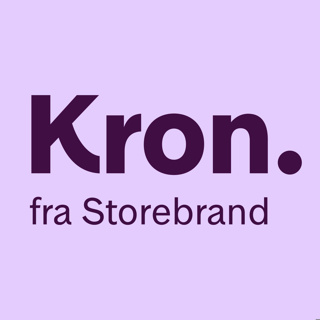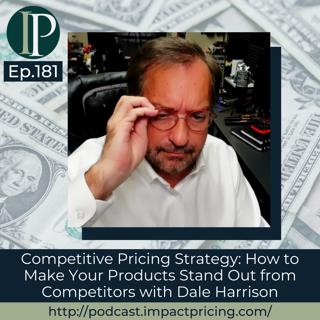
Competitive Pricing Strategy: How to Make Your Products Stand Out from Competitors with Dale Harrison
Dale Harrison has been consulting in life sciences for seven years now, but he's been an executive in biotech for 16 years. Dale started his career as a physicist. In this episode, Dale shares how he’s able to not make biotech products a commodity as he tells us the stories on how he gets inside the minds of both their customers and competitors. Why you have to check out today’s podcast: Understand the importance of stepping outside the product and the company when it comes to making a product stand out in the market; Discover why it’s a must that you get inside the head of both your buyers and competitors, especially with seeing where your competitors are blind in their framework; Find out how to get inside the mindset of your buyers and competitors through stories of tricks that worked “Pricing has little to do with analysis. Analysis is a supporting role, but only supporting. The real issue with pricing is getting inside the head of the customer, and equally importantly, inside the head of your competitor.” – Dale Harrison Topics Covered: 01:02 – Dale’s work around commercial development and its relation to pricing 01:45 – Why Mark despises the word commodity + selling products in the synthetic DNA business back in the 2000s 04:28 – Not making the products a commodity by trying to get into the mindset of the buyer 09:25 – More about the story; The “Got Probes” T-shirt 13:01 – Merging the company with a larger partner and becoming the VP of Sales and Marketing 14:10 – Telling the story about getting inside the heads of the competitors 17:08 – Were they able to charge a higher price because of the red cap? 21:14 – The challenge of keeping customers continuing to reorder and focus on you and not be looking elsewhere 24:05 – Dale’s pricing advice for the listeners Key Takeaways: “Commodity is a mindset. It's not about the product. It's about a failure of imagination around the product. But there are products that are much more commoditized than others.” – Dale Harrison “Again, these are very boring products, so if you talk about the product, no one's going to be interested because everyone already knows it. Nothing's changed and there's literally nothing to talk about. So, you have to talk about something different than the product and then tie it back to the product.” – Dale Harrison “The deal is whatever market you're in, every competitor imagines that they have some highly rational pricing process, and the fact is they don't. What they have is a framework – a mental framework – and their framework is their blindness. And if you can understand what their framework is, you understand where they’re blind. When you know where they're blind, you know how to work around them without them even seeing you.” – Dale Harrison Connect with Dale Harrison: LinkedIn:https://www.linkedin.com/in/dalewharrison/ Email: w.harrison@gmail.com Connect with Mark Stiving: LinkedIn:https://www.linkedin.com/in/stiving/ Email: mark@impactpricing.com
11 Jul 202228min
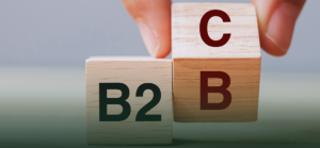
Blogcast #62: The Power of Economic Value
This is an Impact Pricing Blog published on June 1, 2022, turned into an audio podcast so you can listen on the go. Read Full Article Here: https://impactpricing.com/blog/the-power-of-economic-value/ If you have any feedback, definitely send it. You can reach us at mark@impactpricing.com. Now, go make an impact. Connect with Mark Stiving: Email: mark@impactpricing.com LinkedIn: https://www.linkedin.com/in/stiving/
8 Jul 20222min
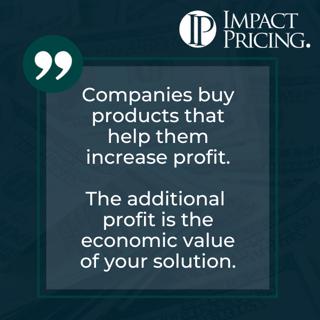
Memecast #65: Economic Value
It's true, every time we buy something, we buy it because we think we get more value than the price it's going to cost us. It's kind of hard for us as consumers to say how much is that value, and we think of that in terms of dollars. But in a corporate setting, how much they value something can almost always be decided by how much money do they think they're going to make or save because they're buying our product or our solution. That amount of money they're going to make or save is called economic value. If we learn how to interpret our features and our benefits into our clients' economic value, and especially if we can learn to help them turn it into economic value, it will become much, much easier for us to close deals and understand why our customers are buying or not buying in the first place. We hope you enjoyed this memecast. This impactful insight came from the book, Selling Value, which I wrote to help salespeople win more deals at higher prices. If you have any questions or feedback, please email me mark@impactpricing.com. Now go make an impact. Connect with Mark Stiving: Email: mark@impactpricing.com LinkedIn: https://www.linkedin.com/in/stiving/
6 Jul 20221min
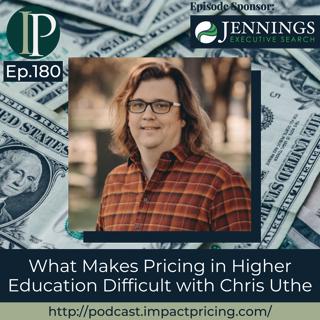
What Makes Pricing in Higher Education Difficult with Chris Uthe
Christopher Uthe is the Director of Product Management at Ocelot, where he champions scalable day-to-day organizational changes to transform it to a product-driven company. He's been working in the education market since 2006, both for an educational institution and for companies that sell education. Chris started his first business at the age of 16. In this episode, Chris explains how pricing works in institutions of higher education as he discusses the factors that make pricing difficult in that field. Why you have to check out today’s podcast: Find out how to find value if you can’t get a good and apt pricing metric Understand how pricing in higher educational institutions work, as well as the thing that makes it difficult Discover why higher education should be more focused on B2C pricing than on B2B “It's so hard to bundle and discount correctly, that most of the time, that's not being done right.” – Chris Uthe Topics Covered: 01:28 – The story behind Chris’ interest in pricing 02:15 – Pricing and purchasing decisions in higher education 04:37 – What institutions of higher education value: The thing that makes pricing in higher education difficult 08:18 – U.S. News and World Report as a metric: The intrinsic value of one’s degree and/or university 11:15 – In B2C vs. in B2B pricing: Where should institutions of higher education be? 14:17 – Talking about RFPs: How it leads us to lose sight of the possibility of a better and smarter solution 19:42 – Chris’ pricing advice for the listeners 21:45 – Connect with Chris Uthe Key Takeaways: “It's so difficult to come at these purchasing decisions, saying, ‘Okay, we have to do only what's best for the student here,’ because you've got so many competing priorities that are sort of odd for the market.” – Chris Uthe “Some would tell you that they don't care. There are a sad few that would tell you they might care a little bit about profit because they do have to pay the bills, still. Not all of them are living on generous endowments, unfortunately, or fortunately, depending on how you look at it. They care about, hopefully, students’ success at the end of the day. They want to talk to you about placement rate. They want to talk to you about probably job acceptance rate. They want to talk to you about average salary coming out of school.” – Chris Uthe “Some of the value – the unspoken value – of your degree or just going to an institution comes from all the doors that it opens for having it on your resume.” – Chris Uthe “It almost always starts with a very altruistic need, which I think is amazing in higher ed, because our students aren't getting the help they need at the right time, for instance, or these students aren't able to log into the learning management system and do something meaningful at the right time or they don't know how to do it, they can't get it done. It starts very altruistic, which is one of my favorite parts of higher education, because it does usually come back to making the student more successful.” – Chris Uthe People / Resources Mentioned: Ocelot: https://www.ocelotbot.com/ CARES Act: https://www.congress.gov/bill/116th-congress/house-bill/748 Connect with Chris Uthe: LinkedIn:https://www.linkedin.com/in/chrisuthe/ Email: uthe@ocelotbot.com Connect with Mark Stiving: LinkedIn: https://www.linkedin.com/in/stiving/ Email: mark@impactpricing.com
4 Jul 202222min

Blogcast #61: Are iPhone Users Not Price Sensitive?
This is an Impact Pricing Blog published on May 25, 2022, turned into an audio podcast so you can listen on the go. Read Full Article Here: https://impactpricing.com/blog/are-iphone-users-not-price-sensitive/ If you have any feedback, definitely send it. You can reach us at mark@impactpricing.com. Now, go make an impact. Connect with Mark Stiving: Email: mark@impactpricing.com LinkedIn: https://www.linkedin.com/in/stiving/
1 Jul 20223min
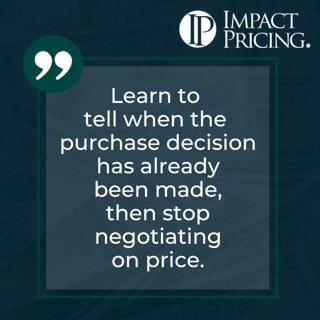
Memecast #64: Stop Negotiating
Oftentimes, salespeople are selling to a committee of people who have to make a big decision. Once they've made the decision, they typically say, hey, we want to go with this vendor, and then they submit it to purchasing or procurement. At that point in time, procurement pretends to be price sensitive, pretends that there's multiple different competitors involved. But if we can recognize that we've already been chosen, then we don't have to compete hard on price. This happens often, especially if we're going to be selling to a committee who has to make a decision. We hope you enjoyed this memecast. This impactful insight came from the book, Selling Value, which I wrote to help salespeople win more deals at higher prices. If you have any questions or feedback, please email me mark@impactpricing.com. Now go make an impact. Connect with Mark Stiving: Email: mark@impactpricing.com LinkedIn: https://www.linkedin.com/in/stiving/
29 Jun 20221min
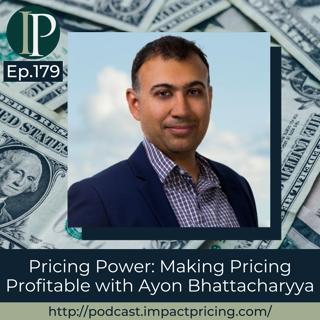
Pricing Power: Making Pricing Profitable with Ayon Bhattacharyya
Ayon Bhattacharyya is the Founder of Biz Growth Spurt, a consulting firm based out of New Zealand. He has experienced pricing in half a dozen companies, and he's a passionate animal welfare advocate. In this episode, Ayon discusses pricing power as he enumerates its four different levels while talking about value-based pricing. Why you have to check out today’s podcast: Understand how pricing power relates to price elasticity Find out what Ayon’s four different levels of pricing power are all about Discover how Mark’s will I? which one? concept relates to these levels “Think about your pricing power, and think about how – whether it's sort of competitive advantage, perceived value, all of those things – what can you do differently to improve your pricing power today.” – Ayon Bhattacharyya Topics Covered: 01:18 – How Ayon got into pricing 02:33 – Defining value-based pricing and relating it to airline pricing 05:57 – Pricing power vs. price elasticity 09:50 – Ayon’s four different levels of pricing power 13:33 – Describing the levels: (1) Cost chaser 15:04 – Describing the levels: (2) Market pricer 15:46 – Describing the levels: (3) Value conqueror 18:16 – Doing behavioral economics at a cost chaser level 19:09 – Applying Mark’s “will I? which one?” concept to Ayon’s levels of pricing power 22:19 – Talking about value-based and fixed pricing 25:26 – Ayon’s piece of pricing advice for the listeners Key Takeaways: “Pricing power is essentially your ability to charge a higher price without losing customers. Another way to say that is a company's ability to get the price it deserves for the value it delivers.” – Ayon Bhattacharyya “A maturity suggests that you need to get there over a period of time; you grow into it. It can't be something that you just start out with that, at level three. But that's not what I'm trying to say here. You can actually start out and you can be an early-staged business and you can start out as a value conqueror. You don't need to progress from level one to get to level three. You can start at level three.” – Ayon Bhattacharyya “There are some businesses that can just start at a higher level, but I think generally, it is a journey. I think of pricing strategy as a journey, not just an outcome.” – Ayon Bhattacharyya People / Resources Mentioned: Biz Growth Spurt: https://bizgrowthspurt.com/ Stephan Liozu and his book: The Pricing Journey Connect with Ayon Bhattacharyya: Website: https://bizgrowthspurt.com/ LinkedIn: https://nz.linkedin.com/in/ayonb Email: b@bizgrowthspurt.com Connect with Mark Stiving: LinkedIn: https://www.linkedin.com/in/stiving/ Email: mark@impactpricing.com
27 Jun 202227min

Blogcast #60: How Much Does a Buyer Values Your Product?
This is an Impact Pricing Blog published on May 18, 2022, turned into an audio podcast so you can listen on the go. Read Full Article Here: https://impactpricing.com/blog/how-much-does-a-buyer-value-your-product/ If you have any feedback, definitely send it. You can reach us at mark@impactpricing.com. Now, go make an impact. Connect with Mark Stiving: Email: mark@impactpricing.com LinkedIn: https://www.linkedin.com/in/stiving/
24 Jun 20222min




















